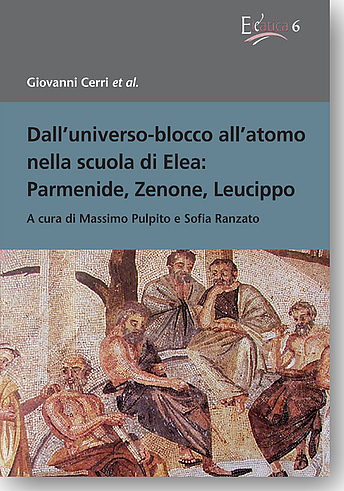Per lungo tempo Parmenide è stato ritenuto il primo vero metafisico della storia, teorico di un essere disincarnato e inaccessibile alla conoscenza scientifica del mondo. Giovanni Cerri, nelle sue Lezioni Eleatiche, ritorna sulla sua nota interpretazione dell'Eleate come uno scienziato pienamente consapevole dei fondamenti epistemologici del sapere e capace di prefigurare l'esito ultimo dell'evoluzione della scienza. Ma Cerri ci mostra anche come a sostegno della sua lettura si stagli l'opera di due pensatori cresciuti nel seno stesso della scuola di Elea: Zenone, con i suoi ragionamenti contro la molteplicità, e Leucippo, l'ideatore dell' atomismo. A discutere questa ampia interpretazione di una pagina cruciale della storia del pensiero, sono stati chiamati dieci studiosi con cui Cerri si intrattiene nelle pagine conclusive del volume in un fitto dialogo.
For a long time, Parmenides was considered the first true metaphysician in history, a theorist of a disembodied being inaccessible to scientific knowledge of the world. Giovanni Cerri, in his Eleatic Lectures, returns to his well-known interpretation of the Eleate as a scientist fully aware of the epistemological foundations of knowledge and capable of foreshadowing the ultimate outcome of the evolution of science. But Cerri also shows us how his reading is supported by the work of two thinkers who grew up in the very bosom of the school of Elea: Zeno, with his arguments against multiplicity, and Leucippus, the originator of atomism. To discuss this interpretation, ten scholars have been called upon, with whom Cerri engages in a dense dialogue in the volume's concluding pages.
Lange Zeit galt Parmenides als der erste echte Metaphysiker in der Geschichte, der Theoretiker eines enthaltsamen Wesens und für das wissenschaftliche Wissen der Welt unzugänglich. Giovanni Cerri kehrt in seinen Eleatischen Lektionen zu seiner bekannten Interpretation des Eleaten als Wissenschaftler zurück, der sich der erkenntnistheoretischen Grundlagen des Wissens voll bewusst ist und das endgültige Ergebnis der Evolution der Wissenschaft vorausahnen kann.


